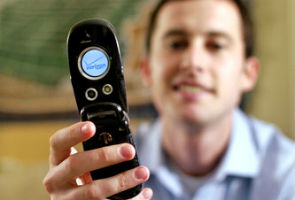Now, a smartphone app that recognises stress from your voice

The app called 'StressSense' is first trained to recognise a person's unstressed voice.
For that, users must relax and read a 3-minute passage from a book into their phones.
The system then compares this recording to its pre-programmed knowledge of the physiological changes that stress induces like speaking at a faster rate and a clipped frequency spectrum.
The application then takes note of any instances of stress it detects in the voice.
"Our stress model also adapts to different background noise environments," New Scientist quoted Hong Lu of Intel in Santa Clara, California, who developed the system, as saying.
In tests that included putting volunteers through mock job interviews, the researchers found their prototype's stressrecognition accuracy to be 81 per cent indoors and 76 per cent outdoors, where sound quality wasn't as good.
The team plans to make the system a plug-in to an Android application called BeWell, which uses a phone's accelerometers and Global Positioning System (GPS) sensors to record users' activity and sleep levels.
Smartphone users will be able to set StressSense to either listen to their voice throughout the day, or only to activate when they are having a phone conversation.
The app will be presented at the Ubicomp conference in Pittsburgh, Pennsylvania, next month.
For details of the latest launches and news from Samsung, Xiaomi, Realme, OnePlus, Oppo and other companies at the Mobile World Congress in Barcelona, visit our MWC 2026 hub.
Related Stories
- Samsung Galaxy Unpacked 2026
- iPhone 17 Pro Max
- ChatGPT
- iOS 26
- Laptop Under 50000
- Smartwatch Under 10000
- Apple Vision Pro
- Oneplus 12
- OnePlus Nord CE 3 Lite 5G
- iPhone 13
- Xiaomi 14 Pro
- Oppo Find N3
- Tecno Spark Go (2023)
- Realme V30
- Best Phones Under 25000
- Samsung Galaxy S24 Series
- Cryptocurrency
- iQoo 12
- Samsung Galaxy S24 Ultra
- Giottus
- Samsung Galaxy Z Flip 5
- Apple 'Scary Fast'
- Housefull 5
- GoPro Hero 12 Black Review
- Invincible Season 2
- JioGlass
- HD Ready TV
- Latest Mobile Phones
- Compare Phones
- Apple iPhone 17e
- AI+ Pulse 2
- Motorola Razr Fold
- Honor Magic V6
- Leica Leitzphone
- Samsung Galaxy S26+
- Samsung Galaxy S26 Ultra
- Samsung Galaxy S26
- MacBook Pro 16-Inch (M5 Max, 2026)
- MacBook Pro 16-Inch (M5 Pro, 2026)
- Apple iPad Air 13-Inch (2026) Wi-Fi + Cellular
- Apple iPad Air 13-Inch (2026) Wi-Fi
- Huawei Watch GT Runner 2
- Amazfit Active 3 Premium
- Xiaomi QLED TV X Pro 75
- Haier H5E Series
- Asus ROG Ally
- Nintendo Switch Lite
- Haier 1.6 Ton 5 Star Inverter Split AC (HSU19G-MZAID5BN-INV)
- Haier 1.6 Ton 5 Star Inverter Split AC (HSU19G-MZAIM5BN-INV)















